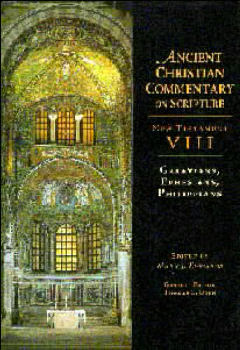
|
Posted April 27, 2006
Book: Ancient Christian Commentary on Scripture: New Testament VIII: Galatians, Ephesians, Philippians Edited by Mark J. Edwards InterVarsity Press, Downers Grove, IL, 2005, pp.318 An Excerpt from the Jacket:
An Excerpt from the Book: “Then after three years I went up to Jerusalem to visit Cephas, and remained with him fifteen day. But I saw none of the other apostles except James the Lord’s brother. (In what I am writing to you, before God I do not lie!) Then I went into the region of Syria and Cilicia. And I was still not known by sight to the churches of Christ in Judea; they only heard it said, “He who once persecuted us is now preaching the faith he once tried to destroy.” And they glorified God because of me.” Overview: Paul visited Peter simply from goodwill (Augustine) and because of his high standing (Marcus Victorinus), thus demonstrating his own humility. He remained long enough for a friend (Chrysostom), not long enough for a disciple. He recognizes James as an apostle (Jerome) and as the “brother of the Lord” (Chrysostom), though this is not meant literally (Theodoret). With an oath that does not transgress Christ’s precept (Augustine, Jerome) Paul shows that his gospel had taken effect even in his absence (Marius Victorinus) and that he had neither preached circumcision (Chrysostom) nor learned Christianity in Judea (Jerome), where Jews and Gentiles remained separate (Augustine). He candidly recalls his former sins (Chrysostom) and, though aware that his conversion was remarkable (Marcus Victorinus), claims no merit (Chrysostom). 1:18a Visiting Peter in Jerusalem Whether his knowledge came from Peter, to whom Christ committed so much authority. Marcus Victorinus: For if the foundation of the church was laid in Peter, to whom all was revealed, as the gospel says, Paul knew that he ought to see Peter. When he speaks of seeing Peter, it is as one to whom Christ had committed so much authority, not as one from whom he was to learn anything. . . “How,” [he implies], “could I learn this great knowledge of God from Peter in such a short time?” Epistle to Galatians 1.1.18 Why Visit Peter? Chrysostom: What greater humility of soul could there be? For after so many conversions, having no need of Peter or of speech with him but being equal with him in honor — for I say no more at present — he nonetheless goes up to him as to one who is greater and senior . . .and he says not “to see Peter” but to visit Peter, as people say when acquainting themselves with great and splendid cities. Homily on Galatians Fraternal Love Magnified Augustine: If, when Paul had evangelized Arabia, he subsequently saw Peter, it was not so that he might learn the gospel from Peter himself (for then he would have seen him before) but so that he might enhance familial love by being with the apostles. Table of Contents: General introduction Abbreviations Introduction to Galatians, Ephesians, Philippians Commentary on Galatians Commentary on Ephesians Commentary on Philippians Appendix: Early Christian writers and the documents cited Timeline of Writers of the Patristic period Bibliography |
|
